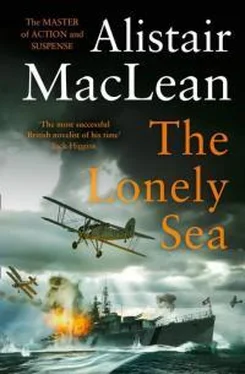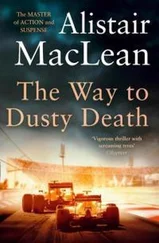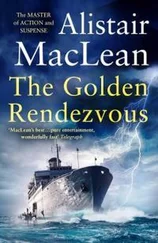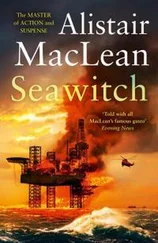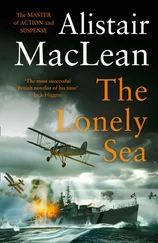Another exploding shell, and the main steering controls were severed. At once Captain Fegen ordered the quartermaster back to the emergency steering position – whatever happened they must retain steering control, move in ever closer on the German battle cruiser. The bridge, burning more furiously than ever and beginning to buckle under the captain’s feet, became completely untenable. Steadying himself with his one good arm, Fegen descended the twisted steel ladder and staggered aft, along the promenade deck, through the choking smoke and eddying flames, to the emergency bridge, every foot of his progress marked by a smeared trail of blood on the charred and blackened decks.
Arriving aft, Captain Fegen, his face now chalkwhite and bloodless and wracked by that murderous pain to which he never once gave expression, found himself too weak to climb up to the control position: but he was still the captain, still in command, with no purpose left in life but to shorten the distance between himself and the Admiral Scheer , to give the convoy every life-giving moment of grace he could so that they might make good their escape into the swiftly gathering dusk.
And thinking ever of the convoy, he ordered more smoke-floats to be dropped, to hide HX 84 from the Scheer. He ordered burning cordite charges to be thrown overboard, fresh crews to man the few guns still firing, in place of those men who lay dead around them. But even yet, those worn and useless guns could not reach the enemy.
Another 11-inch shell, another and another, and now the engine room was destroyed, the engines smashed and drowned under hundreds of tons of water. Fogarty Fegen no longer cared. A 14,000 ton ship travelling at maximum speed has tremendous way on her, and he knew that the Jervis Bay had more than enough way in reserve to keep her closing on the Admiral Scheer in the brief span of life that was left to both himself and his ship.
A deafening roar, a flash of searing flame and the after control position above Fegen’s head vanished in the concussive blast of yet another detonating shell. Undaunted, this incredible man, blood still pouring from his shattered shoulder and head-wounds, lurched his dying way back through the smoke and the flames, intent on reaching the blazing bridge he had so lately abandoned, to continue the fight – if this ghastly massacre could be called a fight – from there.
But he never reached that shattered bridge again. Somewhere in the flames he was struck down by a bursting shell, and death must have been instantaneous for, by any medical standards, he was dead on his feet before that shell finally sheared the slender thread of life to which he had clung with such unbelievable courage and tenacity.
In the one brief hour of a November dusk, Fogarty Fegen won for himself the posthumous Victoria Cross and a name which will always be remembered, with that of Sir Phillip Sydney, as a symbol of defiance and an almost inhuman gallantry in the face of fearful odds. The Victoria Cross and an assured immortality – but probably Captain Fegen would have cared for neither. He had done his job. He had stolen from Kapitän Krancke of the Admiral Scheer those vital moments that were never to be regained, and thereby saved the greater part of the convoy.
Fegen was dead, but the victory was his. But not only Fegen’s. Every man under his command had fought, till the guns had fallen silent and fighting was no longer possible, with the same gallantry as their captain. For most of them, the price of their magnificent defiance had been the same. Of the 260 of the crew, almost two hundred were already dead or terribly wounded and about to die.
Listing, sinking deeply by the stern and now all but stopped in the water, the Jervis Bay, still with shells crashing through the smoke and the flame that now consumed almost her entire length, was obviously about to go at any moment. Those who were left – and they were not many – abandoned the dying ship just minutes before she slid stern-first under the waves, taking with her all those in the sea too near or too weakened by wounds to resist the tremendous suction.
It is unlikely that any of the others who escaped would have survived for long – the Admiral Scheer made no attempt to pick them up – had not Captain Sven Olander, master of the Swedish vessel Stureholm, conscious of the great debt they owed to the survivors of the ship that had saved the convoy, ignored all orders and turned back in the darkness of the night to search for the men of the Jervis Bay. It was an act of the utmost courage, for all night long the Admiral Scheer, robbed of her prey, was prowling around the area, firing off star shells as she hunted for the now far scattered members of HX 84. But the great risk Olander took was justified over and over again: they found and rescued from the freezing night waters of the Atlantic no fewer than sixty-five survivors.
A hopeless sacrifice, many people later called the loss of the Jervis Bay. Sheer senseless destruction to send in a cockleshell like the Jervis Bay against the might of a pocket battleship, a folly and a bravado that amounted to nothing less than madness. No doubt such people are right. No doubt it was madness, but one feels that Fegen and his men would have been proud to be numbered among the madmen of this world.
And one feels, too, that it would be unwise, to say the least, to express such harsh sentiments in the hearing of any of the members of the crews of the ships of Convoy HX 84 that came safely home again because Fogarty Fegen and the men of the Jervis Bay had moved out into the path of the Admiral Scheer and died so that they might live.
I don’t know how much old Glass was worth. Come to that, I don’t suppose he knew himself. But he was as rich as Croesus, that’s a fact.
But Croesus or no, peer of the realm or no, he was still the same old Duncan Glass and hardly a week went by but he came down from the Big House to my harbour office to pass the time of day with me. But he’d something on his mind that Saturday – a sunny breezy morning in late June.
He got his pipe drawing well, then looked round the harbour, at the waves sparkling in the sunshine, at the mast-tops of the fishing boats dancing in the breeze. Then he turned to me, direct as always.
‘Tom,’ he said quietly, ‘what do you think of them? Really think of them, I mean.’
‘Think of who?’
‘You know damn well who! The Tallons, of course.’ He jerked his pipe stem in the direction of the two men working round an old varnished yellow pine fishing boat. ‘Look at them. A holiday, every other man going to the Games, and there they are, still at it.’
‘They seem to like working,’ I said, mildly enough.
Lord Glass glared at me. ‘I didn’t ask you…’
‘All right, all right,’ I said quickly. ‘Well, if you must know, I like old John Tallon and his son.’
Glass glared at me again. ‘No one else does.’
‘No?’ I nodded through the window, then caught Glass’s arm as he reached for the door handle. ‘Leave her be, Duncan. What harm can she come to?’
‘Aye, maybe you’re right,’ he muttered. ‘For the moment anyway.’
He stood in silence and watched the young girl walking down the quay, dark hair and red kilt blowing in the breeze, one hand holding canvas, paints, and brushes while she waved to the Tallons with the other. As she came opposite the Tallons’ boat, the Jeannie, a young man jumped up on the quay, smiled and spoke to her. Moments later he was sitting on a bollard, looking at the canvas the young girl was showing him. The black and flaxen heads were very close together.
Читать дальше
